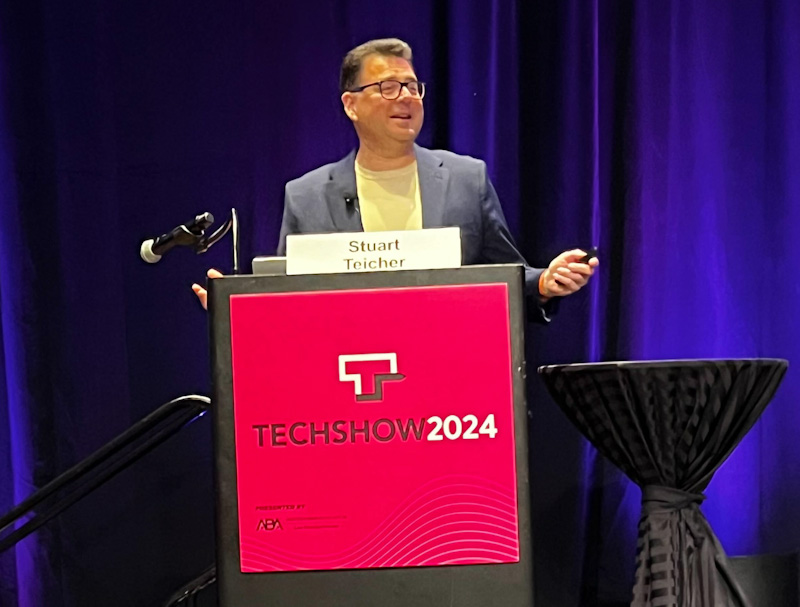Yes, your technology is spying on you; what can be done about it?

“My job is to sense a problem coming,” said Stuart I. Teicher, an attorney, a legal educator and the keynote speaker at the ABA Techshow 2024 on Friday. (Photo by Danielle Braff)
As eager techies packed the Hyatt Regency Chicago for the third day of the ABA Techshow 2024, one ethics lawyer had a message that he wanted to make crystal clear: Technology may be your best friend, but it could simultaneously be your downfall.
“My job is to sense a problem coming,” said Stuart I. Teicher, an attorney, a legal educator and the keynote speaker at the Techshow on Friday.
“I’m like the emergency alert system for the legal world,” he said, adding that he—like the rest of the MacBook-clad, AirPods-wielding, device-obsessed people in the room—also appreciates what tech can do for the legal world.
But ethically? Be warned, he said.
Teicher referred often to recent ethical concerns tied to tech, including the viral 2022 video of a woman discovering that her boyfriend was cheating on her after uncovering retrieved Amazon Alexa recordings, and a Roomba video released that same year of a woman on a toilet.
The moral of the story, he explaineed, is that everyone is listening, and you never know who is watching. When this is transferred over to legal tech, the results could get attorneys into a lot of trouble.
“Everything that can go in can come out,” Teicher said.
If that’s the case, an attorney’s duty is to make reasonable efforts to safeguard client information. This means completely understanding the tech before using it and supervising every bit of information that’s entered into the system.
Follow along with the ABA Journal’s coverage of the ABA Techshow 2024 here.
Lawyers have always been trained to supervise nonlawyers, he added. And because so much of our current tech is designed to think like human intelligence, we have a duty to supervise our software just as we would a nonlawyer or other human.
Generative artificial intelligence, he said, is similar ethically as inexperienced or overly confident nonlawyer assistants. So before using it, you have to completely educate yourself about the underlying tech, which is changing rapidly.
Even if you’re unsure whether your law firm is going to take advantage of all the legal tech available, it’s crucial to learn about it, he argued. When email was first introduced, firms were not given the option to use it because clients had a reasonable expectation of privacy that was thought would be violated. In 1999, the rules of confidentiality changed, and lawyers were given the go-ahead to send emails with reasonable precautions.
Slowly, issues developed, starting with Gmail, which added advertisements on the email recipient’s end that were not created by humans and therefore were deemed to be OK given the privacy rules.
This escalated. And today, even tech that is commonly used, such as Dropbox, is openly viewed and shared by humans without our knowledge, Teicher said. A good attorney should not only understand the tech but should foresee every possible outcome and problem with it from an ethical and data breach standpoint.
“Nobody is coming in the front door, but it sure seems like all of our information is going out the back door,” he said.



